Hon Hai Precision Industry Co (鴻海集團) chairman Terry Gou (郭台銘) announced last week that the goddess Matsu called on him in a dream to enter next year’s presidential race so as to improve the lives of Taiwanese, throwing a wrench into the Chinese Nationalist Party’s (KMT) primary and shining a spotlight on a common practice: candidates for elected office appearing at temples to call on the goddess of compassion to assist them in their candidacy.
“Matsu told me to [run],” Gou, one of Taiwan’s wealthiest businessmen, told a media scrum and supporters at Cihui Temple (慈惠宮) in New Taipei City’s Banciao District (板橋).
The billionaire and neophyte politician follows a long tradition of candidates appearing at temples and religious festivals devoted to Matsu in the year leading up to a national election so as to mingle with constituents at the local level, and have their image beamed into living rooms throughout the nation.
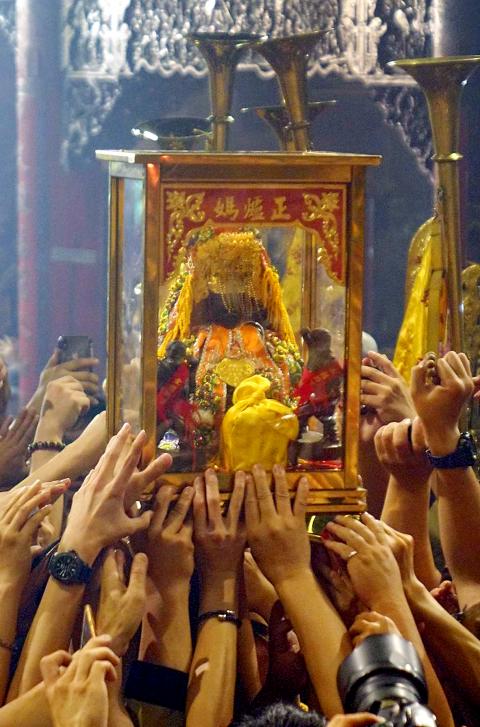
Photo: Liao Yao-tung, Taipei Times
But who is Matsu and why is she the perennial favorite that politicians call on to insinuate the deity’s virtue into their campaign? The various names attributed to Matsu throughout history — shaman (巫), filial lass, celestial consort (天妃), celestial empress (天后), avatar of the Buddhist bodhisattva Guanyin (觀音), divine matriarch in heaven above (天上聖母) and, in the past few years, goddess of cross-strait peace — illustrate her rise to a pan-Chinese cultural symbol associated with compassion and protection, with elements of Confucianism, Buddhism and Taoism.
Most commonly, the devout simply call her Matsu (媽祖), or female ancestor, a title meant to show that she’s close to the people and, with Taiwan’s politics being so divisive, she serves as a powerful symbol of unity — benevolent, compassionate and peaceful. And she is everything for everyone — uniquely Taiwanese for those who believe in independence, but also Chinese for those who tend to see China and Taiwan as “one family on both sides of the Taiwan Strait” (兩岸一家親).
TRANSACTIONAL MATSU
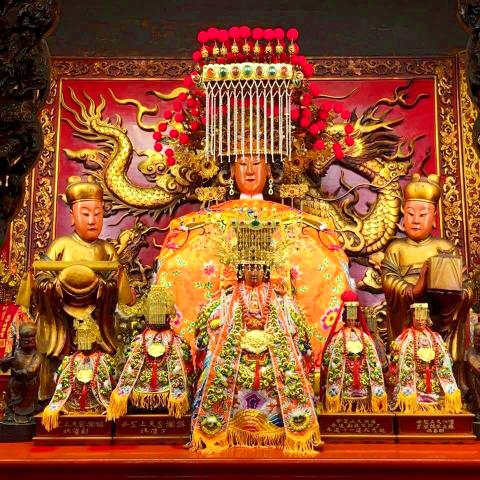
Photo: Courtesy of Dajiamatsu Facebook page
Politicians and the temples they visit benefit from the transaction: politicians revel in the media attention that a visit to larger Matsu temples generate, and temples — and those who run them — are granted legitimacy on the national stage.
Take the Dajia Matsu, a nine-day pilgrimage through central and southern Taiwan that ended last week and attracted over a million visitors and intense media attention. With the exception of Gou, all major politicians from across the political spectrum who have declared, or may declare, their candidacy for president — former New Taipei City mayor Eric Chu (朱立倫), Legislator Wang Jin-pyng (王金平) and Kaohsiung Mayor Han Kuo-yu (韓國瑜) of the KMT; William Lai (賴清德) and incumbent Tsai Ing-wen (蔡英文) of the Democratic Progressive Party (DPP), as well as Taipei Mayor Ko Wen-je (柯文哲) — appeared at some point during what is billed as Taiwan’s largest religious event.
What differentiates Gou from other current and previous politicians, who typically appear in front of a temple’s main deity before an election to make a vow that they will serve the people, is that he had the cheek to say that Matsu came to him in a dream. Emphasizing that Matsu told him to run draws attention to a number of biographical details that will almost certainly resonate with voters.
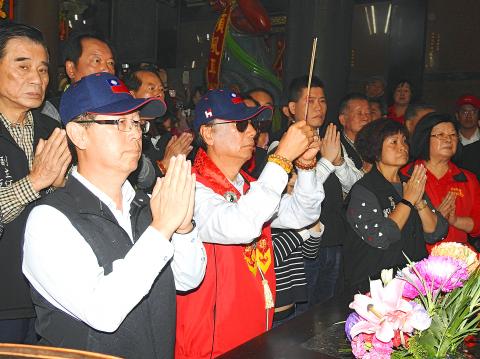
Photo: CNA
First, Gou’s rags-to-riches biography is the stuff of legend. According to Chinese-media reports, he was born in Cihui Temple a year after the KMT fled China in 1949, and lived there for many years. It is for this reason that Gou has called himself “Matsu’s godson (媽祖乾兒子),” and has explicitly stated that it was Matsu’s benevolence that enabled him to become a successful businessman.
Additionally, as Matsu’s godson, he can serve as an emissary of peace, as an intermediary between China and the US, where he has business, and serve as a spokesperson for cross-strait peace, being the person who can negotiate with China in a political sense in the same way he has successfully done in an economic one.
Finally, Matsu is a softening influence, lending this hard-edge businessman-turned-politician a touch of the feminine.
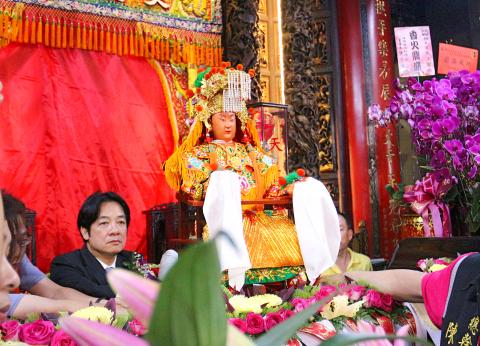
Photo: CNA
FAUX-MATSU
Although many Chinese-language outlets correctly point out that it remains to be seen how Gou will improve the lives of Taiwanese while maintaining peace across the Taiwan Strait, that’s not the point. The point is that Matsu has chosen him, the gods are on his side, and that destiny will take care of the rest.
By invoking Matsu, Gou can make all sorts of claims that are in opposition to his own record. Although he says that he can create wealth in Taiwan, he is one of many businessmen that moved the majority of his business to China in the 1980s, as Taiwan’s economy began to slump. Of course, where he sets up his plants are his business, but there is little to suggest that the kind of generosity Matsu worshipers exhibit during the Matsu pilgrimage — handing out free food and water — will be emulated by Gou.
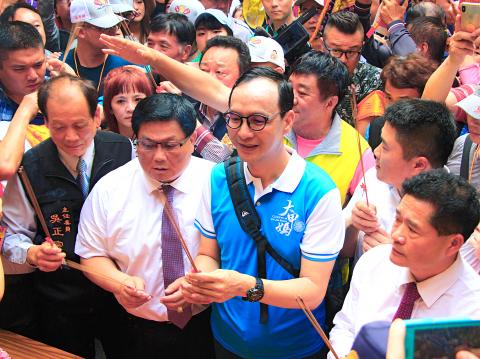
Photo: CNA
And it’s difficult to square Gou’s record of labor and environmental safety with Matsu’s protection. His seeming indifference to the numerous suicides at his factories in China over the past few years — aside from the hit that Hon Hai’s reputation took — raises questions about how compassionate he is as a leader.
Like Yen Ching-piao (顏清標), the gangster chairman of Jenn Lann Temple (鎮瀾宮), which operates the Dajia Matsu pilgrimage, Gou is an emperor within his own realm who will not be questioned. At a panel earlier this month to celebrate the 40th anniversary of the Taiwan Relations Act, Gou became visibly angered when DPP legislator Hsiao Bih-khim (蕭美琴) wouldn’t allow him to ask a question on Taiwan’s economic future because the panel’s time was up, and wouldn’t look at him when he demanded that she do so.
But an appeal to Matsu erases these lapses, or at the very least softens some of Gou’s sharper edges. With his rags-to-riches back story and current narrative, Gou becomes more relatable to any farmer, fisherman or office worker who has called on Matsu’s benevolence for practical and spiritual guidance.
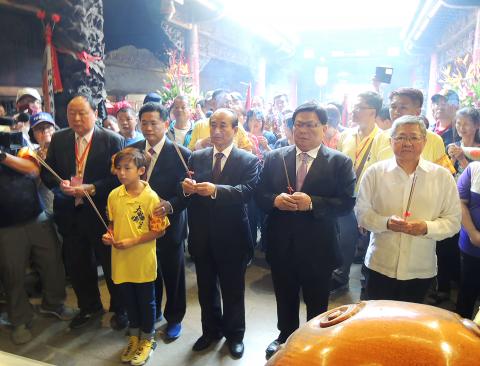
Photo: CNA
Gou can’t reference his years of public service because none exist; instead he dreams that Matsu has signed off on his candidacy. He doesn’t have to say anything else. The question is, will voters demand that he say more?

In recent weeks the Trump Administration has been demanding that Taiwan transfer half of its chip manufacturing to the US. In an interview with NewsNation, US Secretary of Commerce Howard Lutnick said that the US would need 50 percent of domestic chip production to protect Taiwan. He stated, discussing Taiwan’s chip production: “My argument to them was, well, if you have 95 percent, how am I gonna get it to protect you? You’re going to put it on a plane? You’re going to put it on a boat?” The stench of the Trump Administration’s mafia-style notions of “protection” was strong

Every now and then, it’s nice to just point somewhere on a map and head out with no plan. In Taiwan, where convenience reigns, food options are plentiful and people are generally friendly and helpful, this type of trip is that much easier to pull off. One day last November, a spur-of-the-moment day hike in the hills of Chiayi County turned into a surprisingly memorable experience that impressed on me once again how fortunate we all are to call this island home. The scenery I walked through that day — a mix of forest and farms reaching up into the clouds

With one week left until election day, the drama is high in the race for the Chinese Nationalist Party (KMT) chair. The race is still potentially wide open between the three frontrunners. The most accurate poll is done by Apollo Survey & Research Co (艾普羅民調公司), which was conducted a week and a half ago with two-thirds of the respondents party members, who are the only ones eligible to vote. For details on the candidates, check the Oct. 4 edition of this column, “A look at the KMT chair candidates” on page 12. The popular frontrunner was 56-year-old Cheng Li-wun (鄭麗文)

“How China Threatens to Force Taiwan Into a Total Blackout” screamed a Wall Street Journal (WSJ) headline last week, yet another of the endless clickbait examples of the energy threat via blockade that doesn’t exist. Since the headline is recycled, I will recycle the rebuttal: once industrial power demand collapses (there’s a blockade so trade is gone, remember?) “a handful of shops and factories could run for months on coal and renewables, as Ko Yun-ling (柯昀伶) and Chao Chia-wei (趙家緯) pointed out in a piece at Taiwan Insight earlier this year.” Sadly, the existence of these facts will not stop the